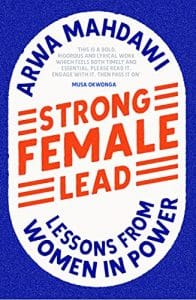Do you know what Andrew Cuomo absolutely does not have? Impostor syndrome: the psychological phenomenon where you feel that you’ve only succeeded because of dumb luck and are going to be found out any day; the constant nagging feeling that you’re not good enough even if there’s plenty of evidence that shows you most certainly are. Women tend to be plagued with impostor syndrome because, from a very early age, we’re bombarded with messages that tell us that we’re not as good as men. We’re bombarded with messages that tell us we shouldn’t take up space, we shouldn’t be too loud, we shouldn’t be too clever. And so we internalize those messages and learn to doubt ourselves.
Getting rid of a lifetime of insidious social conditioning is tough: even some of the world’s most powerful women admit to still feeling impostor syndrome. In 2018, for example, Michelle Obama told an audience of British schoolgirls that she still had feelings of self-doubt and impostor syndrome. Finland’s Sanna Marin, who became the youngest serving prime minister in the world in 2019, has also admitted to feelings of inadequacy. As has Jacinda Ardern. In a December 2020 interview26 with John Kirwan, a former All Black and mental-health advocate, Ardern said she suff ers from impostor syndrome, but tries to channel it into something that drives her to be better. ‘Some of the people I admire the most have that self-consciousness and that slight gnawing lack of confidence,’ Ardern said. When she starts to doubt herself, she asks why that is. ‘Does it mean I need to do a bit more prep, do I need to think more about my decision making?’ Instead of allowing feelings of self-doubt to undermine her, she uses it to propel herself to be better.
The traditional thinking around confidence is that the more you have of it, the better. Women have been told to take up space, speak up and act like men. You’ve probably seen a frequently cited statistic which shows men apply for a job when they meet only 60% of the qualifications, but women apply only if they meet 100% of them. That statistic isn’t actually based on a study, it’s completely speculative. Nevertheless it is frequently used to tell women that they should have more faith in themselves and apply for positions for which they are underqualified. Perhaps the more important lesson from that study, however, is that we should be encouraging more men to be competent rather than confident. Again, instead of telling women to act like men, we should be telling men to act more like women.
Also read: At 34, Finland’s Sanna Marin set to become world’s youngest Prime Minister
There’s a balance with all of this, of course. Too little self- confidence is obviously not a good thing. I’m obviously not saying you should only apply for jobs when you perfectly fit the advertised criteria – not to mention, there’s also a much larger conversation to be had here about the gendered way in which many companies advertise their jobs. What I am saying is that we need to stop fetishizing confidence. Indeed, studies show that encouraging women to be overconfident might stop them being effective leaders. According to an analysis of thousands of 360-degree reviews, women outscored men on seventeen of the nineteen capabilities that differentiate excellent leaders from average or poor ones. But even though women scored better on their capabilities, they didn’t rate themselves as highly as men, until the age of forty. ‘It’s highly probable that those women are far more competent than they think they are, while the male leaders are overconfident and assuming they are more competent than they are,’ the researchers noted. ‘It’s possible that these lower levels of confidence at younger ages could motivate women to take more initiative, be more resilient, and to be more receptive to feedback from others, which in turn makes them more effective leaders in the long run.’
Another study, published in the Leadership Quarterly journal, similarly shows that lower levels of confidence can enhance leadership by encouraging self-criticism. If you’re not overly confident then you’re better able to see faults that could be improved or to anticipate problems on the horizon.
Again, the lesson here isn’t that confidence isn’t important: it’s that self-doubt isn’t necessarily a bad thing. In my chat with Mary Robinson, she said she found self-doubt a ‘complete asset’ during her career. A lot of women in leadership, she’d noticed, were full of self-doubt.
‘This is actually a positive. When women leaders meet, we tend to talk about the things we didn’t do well and what we’ve tried to learn from them,’ she told me. ‘I don’t hear men having those conversations. But those conversations are very valuable.’ The sort of self-doubt Robinson is referring to, she clarifies, isn’t the type that undermines you, it’s the type that improves you. ‘I find that any woman leader who’s leading as a woman, tends to have that constant self-correction going on internally, because of the desire to do it as well as possible.’
Studies back that up: a 2019 study from researchers at the University of California, Berkeley, found that doubt piques our curiosity and drives us to learn more. The study challenged the notion that curiosity is the primary driver of learning. According to researchers, it’s uncertainty; it’s that moment when you think you know something and discover you don’t that leads to the most curiosity and learning. One practical application of this, the study suggests, is tailoring classroom learning to misconceptions. So instead of just explaining what causes climate change, you’d ask students what they think causes climate change. When they realize that they don’t have the full picture, they’re more stimulated to learn.
Robinson, it should be noted, may have self-doubt but she’s not exactly short of confidence. One of the most important years of her life, she tells me, was when she did a Master’s in Law at Harvard Law School in the Class of ’68.
Also read: One way for women to tackle an uneven playing field—choose a boss, not a job
‘Most of my American contemporaries were criticizing an immoral war in Vietnam and trying to avoid the draft. Martin Luther King was assassinated in April, Robert Kennedy was assassinated just after I graduated. That year, I saw young people were doing things and they were taking responsibility. They were going into civil-rights programmes. And I came back to Ireland full of what my future husband called my “Harvard Humility”.’ She stood for the Irish Senate the following year and got elected at the age of twenty-five. ‘I would never have been able to do that without the sense as a young person of why not have my voice heard?’ So, again, confidence is important. But, like Goldilocks and the porridge, you need the amount to be just right. Too little confidence paralyzes you. Too much intoxicates you. The best sort of confidence is quiet. This sort of confidence is very different from ‘ego’, which is loud and attention-seeking.
Quietly confident people don’t need to be the centre of attention, they don’t need to win every argument or have the last word, and they aren’t desperate to be liked. When you’re
driven by ego, you worry about how your actions will make you look, rather than their impact: that invariably leads to poor decision making. Boris Johnson is one example of that. Johnson, it’s worth remembering, once allegedly said that he wanted to enter politics because ‘no one puts up statues to journalists’. He may be arrogant, but a frequent observation of people who have worked with him is that he’s desperate to be liked. This means he finds it difficult to make tough decisions and ends up catastrophically zigzagging as he tries to evade responsibility. In December 2020, for example, Johnson promised the UK a five-day reprieve from coronavirus restrictions over Christmas. This was obviously a bad idea and, just three days after he said it would be ‘inhuman’ to cancel Christmas, he ended up cancelling Christmas.
 Excerpted with permission from Strong Female Lead by Arwa Mahdawi, published by Hachette India.
Excerpted with permission from Strong Female Lead by Arwa Mahdawi, published by Hachette India.






